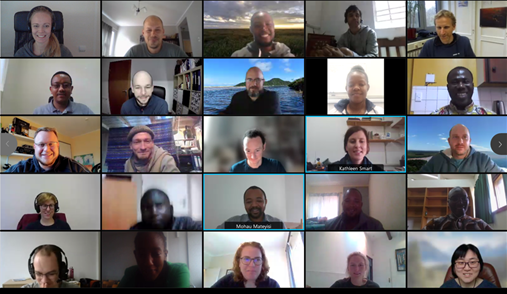17/12/21
Second greenhouse gas measurement workshop completed as virtual training

The second EMSAfrica training workshop in greenhouse gas measurements was conducted on 24.-26.11.2021. Due to the continuing travel restrictions, we conducted the training virtually. Altogether 25 young researchers and technicians from eight different countries, including South Africa, Namibia, Botswana and Nigeria, took part in the ‘Eddy Covariance Flux Measurements Intensive Course’.
The course consisted of a format of presentations, practical training sessions, and discussions. The sessions took us from the theory of Eddy Covariance and tower instrumentation to the conducting of data processing, filtering, screening, gap filling, handling and plotting of Eddy Covariance data. Participants were given a real 1-year dataset from Karoo, South Africa, and expected to put their course skills in practice, by processing and analysing the data themselves in student projects. At a final wrap-up session in December, participants presented their own analyses of either carbon, water or energy fluxes.
With lead teachers Christian Brümmer (Thünen Institute for Climate-Smart Agriculture, Braunschweig, Germany) and Gregor Feig (South African Environmental Observation Network /Expanded Freshwater and Terrestrial Observation Network), visiting lecturers and tutors covered a long list of Eddy Covariance experts from Germany and South Africa: Mohau Mateyisi and Humbelani Thenga (CSIR, South Africa), Amukelani Maluleke (Stellenbosch University), Kathleen Smart (Rhodes University), Antje Lucas-Moffat (German Weather Service DWD), and Oksana Rybchak, Frederik Schrader, Liv Offermanns and Pascal Wintjen (Thünen Institute), as well as Ben Conrad (Campbell Scientific).
Although virtual training does not give same opportunities for hands-on learning, and the next course is planned on a field site in South Africa, we were highly impressed by the active discussions and the engagement from the participants. The virtual training also offered a good opportunity to engage all research group members in Germany, leading into interesting knowledge exchange and discussions on the specific challenges on field work in the North and South.